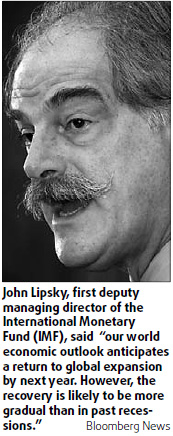

The ongoing financial turmoil has increased demands for the renminbi going global more pressing than ever.
China became the "world's factory" with its export-driven development model, which made the country's real economy vulnerable to global economic fluctuations. The asymmetry between China's status as a trade giant and its obscure currency is increasingly glaring amid the recession sweeping the world.
However, it is not realistic to count on an overhaul on the international monetary landscape in the short run to push the renminbi into the limelight. China central bank governor Zhou Xiaochuan's proposal of creating a super sovereign reserve currency cannot be realized in the short term.
There are also no changes on the special drawing rights of IMF member countries, which means the US still enjoys the right to veto any monetary proposals submitted to the institution.
So China should seek another path to exit from dollar dependence.
The renminbi has now gained some of the needed conditions to become a global currency. The Chinese yuan is playing a bigger role in trade with neighboring countries, which is a good starting point for the yuan to creep onto the international stage.

In Southeast Asian countries such as Laos, Cambodia and the northern part of Myanmar, the yuan has become a major currency to settle bilateral trade. In northern Vietnam, 90 percent of trade bills are paid in yuan. Some residents in these countries have taken the yuan as a safe means of reserve. Backed by China's robust economic growth, the renminbi has won wide recognition from its neighbors as a stable and trustworthy currency.
On top of that, Hong Kong's status as an international financial center has also laid the foundation for establishing the renminbi's offshore market. As China's Special Administrative Region, which has its own currency and is relatively independent from the mainland financial system, Hong Kong boasts unique conditions to develop renminbi's offshore business. In addition, the plan to build Shanghai into an international financial center by 2020 will also help to strengthen the coordination between the renminbi's offshore and onshore markets.
In my opinion, the renminbi could be developed into an international currency by following the phases listed below.
First, the Chinese currency should play a bigger role in international settlement. In the early stage, the renminbi should be gradually accepted by neighboring trade partners as a major currency to settle payment.
Second, the country should set up and enhance the renminbi's offshore market and improve its exchange rate mechanism.
Third, we should expand regional monetary cooperation and promote renminbi into a leading regional currency based on the Chiang Mai initiatives. The Chinese currency should play a key role in the regional monetary system of Asia before it gains the status as a major currency on the international stage.
Going global with its currency will strengthen China's economic clout and cushion the risk of exchange rate swings. With a more internationalized currency, China will have a bigger say in international economic activities and reverse its subordinate status in the international currency regime. Beside, if the yuan can be more widely used in cross-border settlement, the country's pace of accumulating foreign exchange reserves will decelerate and Chinese enterprises will face less risk of exchange rate fluctuations.
On the other hand, the renminbi's internationalization also has some negative effects on domestic financial stability. Better capital flow will lure more foreign investors to speculate on the country's foreign exchange market, which may threaten the country's financial stability. In addition, the central bank will face more difficulties in cash management, as it is hard to monitor the volume of currency needed in overseas markets.
The author is the chief macroeconomic researcher at the SERIChina Economic Research Institute. The opinions expressed in the article are his own
(China Daily 06/29/2009 page2)













